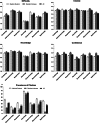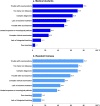Neurophobia among medical students and resident trainees in a tertiary comprehensive hospital in China
- PMID: 37919684
- PMCID: PMC10621143
- DOI: 10.1186/s12909-023-04812-1
Neurophobia among medical students and resident trainees in a tertiary comprehensive hospital in China
Abstract
Background: Medical students and residents have been revealed to have extraordinary difficulties in managing patients with neurological complaints. However, specific information on Chinese trainees is scarce. Herein, we aimed to uncover the presence of, contributing factors for, and potential solutions to neurophobia among medical students and resident trainees in China.
Methods: Questionnaires were administered to the medical students of Peking Union Medical College and residents of the Internal Medicine Residency Training Program at Peking Union Medical College Hospital. We asked about perceived difficulty, knowledge, interest, and confidence in neurology in contrast to six other specialties. The reasons why neurology is regarded as difficult and approaches for improving neurological teaching have been appraised.
Results: A total of 351 surveys were completed by 218 medical students and 133 residents. The response rate exceeded 70% in both groups. The prevalence of neurophobia was 66.1% and 58.6% among medical students and residents, respectively. Respondents declared that greater difficulty was observed in neurology than in other specialties, and the management of patients with neurological problems was the least comfortable (p < 0.0001). Neurophobia has various perceived causes, and neuroanatomy is regarded as the most important contributor. Nearly 80% of medical students felt that improvements in neurology teaching could be achieved through further integration of preclinical and clinical neurological teaching.
Conclusions: The findings of the first survey on neurophobia in China are in accordance with those of previous studies. Neurophobia is highly prevalent in Chinese medical students and residents. Strategies to improve teaching, including enhanced integration of teaching and more online resources, are needed to prevent neurophobia.
Keywords: China; Medical students; Neurophobia; Resident trainees.
© 2023. The Author(s).
Conflict of interest statement
The authors declare no competing interests.
Figures



References
MeSH terms
LinkOut - more resources
Full Text Sources

